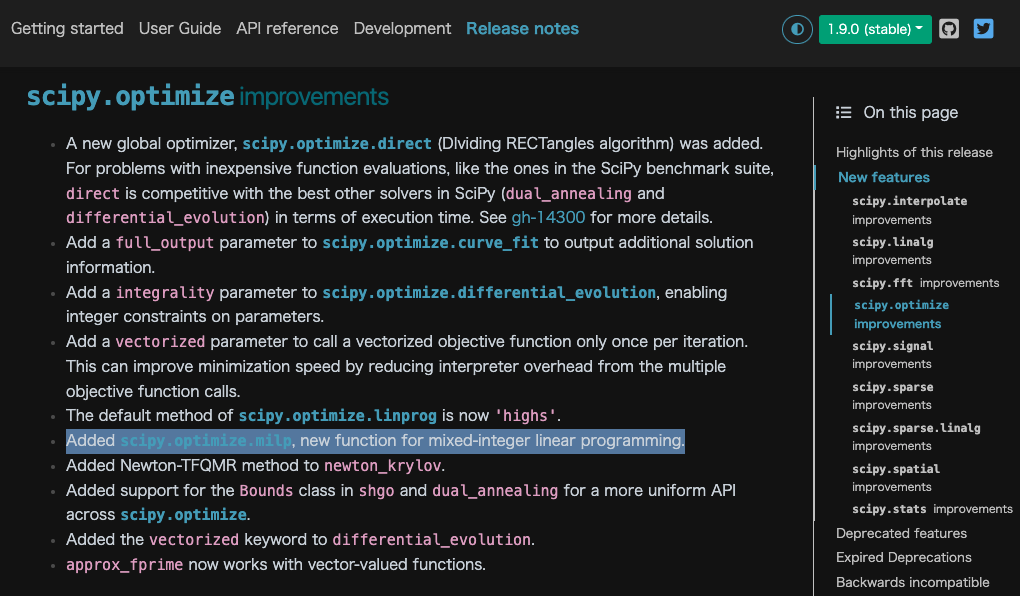モチベーション
2022/07/29に以下図にある通り、SciPy==1.9.0がリリースされてMILPの機能が追加された。
MILPを実務で活用する場合、求解速度の観点からGurobiやCPLEXがを利用するのが一般的である。
しかし、これらの有償ソルバーは高額であり、手軽に活用することはできない。
Gurobiの機能と比較し、SciPyのMILPソルバーが実務適用可能なレベルの性能を備えているか調査した。

https://docs.scipy.org/doc/scipy-1.9.0/release.1.9.0.html
調査結果
1. 表現できるMILPが限定的であり、複雑な実務での定式化を行うことは難しい
基本的に、以下数式で表現される定式化しか解くことができない。
もっとも致命的なのが、決定変数(x)が1次元しか取ることができない。
容器が複数の場合のナップザック問題すら解くことができない。

https://docs.scipy.org/doc/scipy-1.9.0/reference/generated/scipy.optimize.milp.html#scipy.optimize.milp
2. 表現は限定されているものの、求解速度はGurobiに匹敵する
ナップザック問題のitem数を100万とした場合の次のソースコードを実行し、各ソルバーの性能を調べた。
結果はそれぞれ次のようになった。(モデリングにかかる時間は除き、milpを解く時間のみ測定)
- SciPy: 57.9s
- Gurobi: 35.4s
- glpk: 終わらない
100万の規模は無償ソルバーでは解けないため、この結果には少々驚いた。
表現が限定的ではあるが活用先はあるかもしれない。
import numpy as np
import random
import time
import pyomo.environ as pyo
from scipy.optimize import milp
from scipy.optimize import LinearConstraint, Bounds
class KnapsackProblem:
item_num=1000000
seed=12345
def __init__(self):
random.seed(self.seed)
self.item_id_list = [i for i in range(self.item_num)]
self.weight_list = [random.randint(1, 10) for _ in range(self.item_num)]
self.value_list = [random.randint(1, 10) for _ in range(self.item_num)]
self.knapsack_capacity = int(np.sum(self.weight_list)/2)
return None
def create_knapsack_model_by_pyomo():
p = KnapsackProblem()
mdl = pyo.ConcreteModel()
# パラメタ定義
mdl.N = pyo.Set(initialize=p.item_id_list)
mdl.w = pyo.Param(mdl.N, initialize=dict(zip(p.item_id_list, p.weight_list)))
mdl.v = pyo.Param(mdl.N, initialize=dict(zip(p.item_id_list, p.value_list)))
mdl.c = pyo.Param(initialize=p.knapsack_capacity)
# 決定変数
mdl.X = pyo.Var(mdl.N, within=pyo.Binary)
# 目的関数定義
def obj(mdl):
return sum(mdl.v[i]*mdl.X[i] for i in mdl.N)
mdl.obj = pyo.Objective(rule=obj, sense=pyo.maximize)
# 制約条件定義
def const(mdl):
return sum(mdl.w[i]*mdl.X[i] for i in mdl.N) <= mdl.c
mdl.const = pyo.Constraint(rule=const)
return mdl
def time_printer(time):
print("====================================")
print(f"{round(time, 1)}s")
print("====================================")
print("\n\n")
return None
def solve_ksp_by_pyomo(solver):
mdl = create_knapsack_model_by_pyomo()
opt = pyo.SolverFactory(solver)
print(f"solving by {solver}...")
time_start = time.time()
res = opt.solve(mdl, tee=False)
time_finish = time.time() - time_start
print(res)
time_printer(time_finish)
return None
def solve_ksp_by_scipy():
p = KnapsackProblem()
c = -np.array(p.value_list)
A = np.array([p.weight_list])
b_u = np.array([p.knapsack_capacity])
b_l = np.array([0])
integrality = np.ones_like(c)
print("solving by scipy...")
time_start = time.time()
res = milp(c=c,
constraints=LinearConstraint(A, b_l, b_u),
bounds=Bounds(lb=0, ub=1),
integrality=integrality,
)
time_finish = time.time() - time_start
print(res)
time_printer(time_finish)
return None
if __name__ == "__main__":
solve_ksp_by_pyomo("gurobi") # 35.4s
solve_ksp_by_scipy() # 57.9s
結論
実務MILPを解く場合は、GurobiやCPLEXを使うしかない。